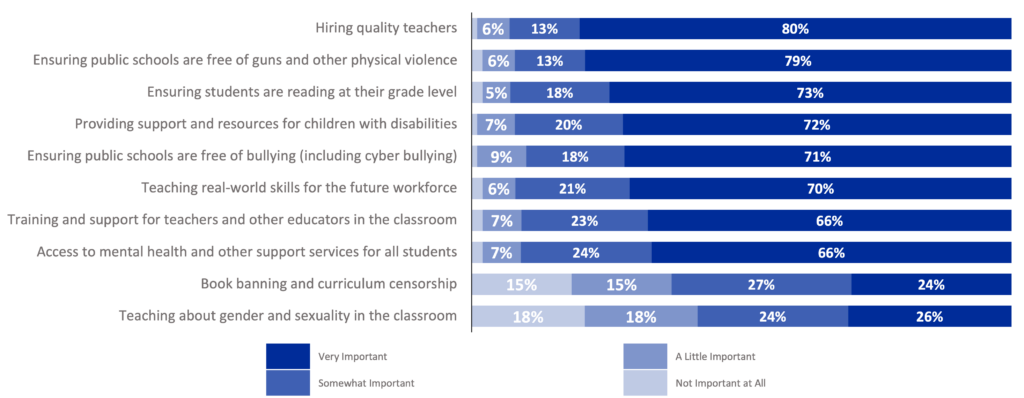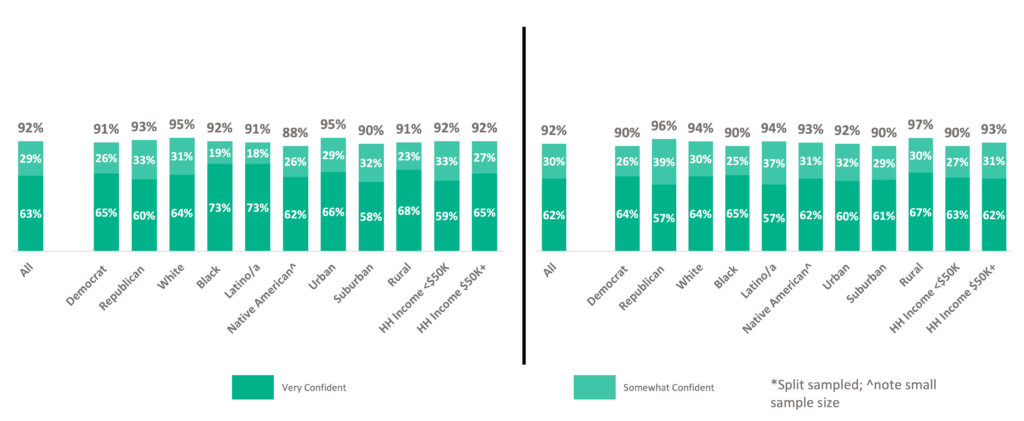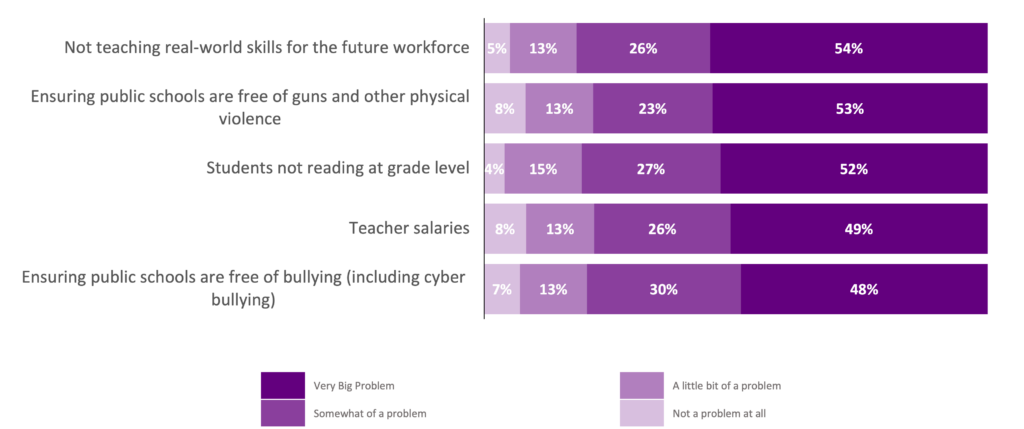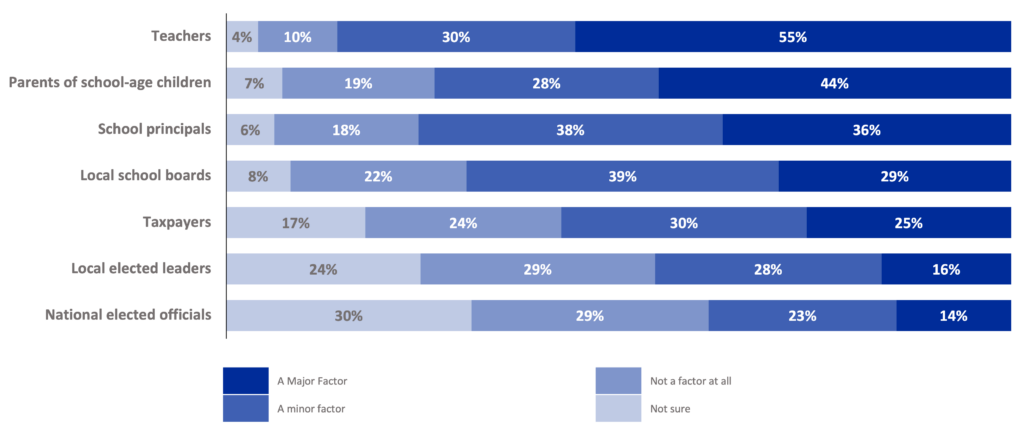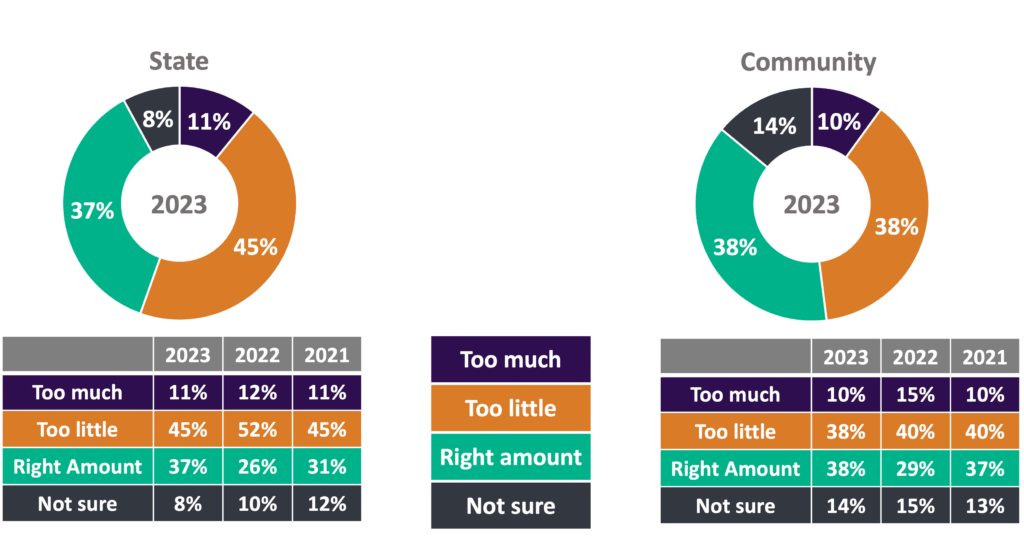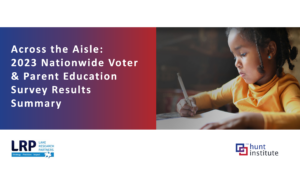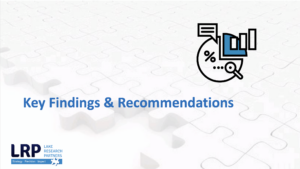2023 Across the Aisle Report: Cutting Through the Noise: Parents and Voters Want Real-World Skills, Safe Schools, and Literacy
December 14, 2023
2023 Across the Aisle: Bridging the Education Divide
Cutting Through the Noise: Parents and Voters Want Real-World Skills, Safe Schools, and Literacy
Education has been dominating headlines across the country. States and communities continue to recover from extensive learning loss associated with the pandemic as research suggests the average public school student lost half a year of learning in math and a quarter of a year in reading as a result of the pandemic. Growing interest in mechanisms for private school choice like education savings accounts has reinvigorated the school choice movement across the country. And debates over books, curriculum censorship, and parental oversight have fanned political flames and ignited discussions about what and how students should learn. These conversations are shaping the educational narrative nationally, but are they truly aligned with what parents and voters care about when it comes to their child’s education?
As communities nationwide settle into our “new normal” post-pandemic, The Hunt Institute has remained committed to capturing and amplifying parent and voter priorities for our K-12 education systems. Now in its third year, The Hunt Institute’s Across the Aisle: Bridging the Education Divide report dives deeper into public perceptions around key educational issues.
The survey, developed in partnership with Lake Research Partners, captures insights from parents and voters on a variety of education issues ranging from career readiness, student mental health, and childhood literacy, to “hot-button” topics like school choice, parental involvement in education, and more. Our full report dives even further into these insights, disaggregating many issues by political affiliation, gender, geography, socio-economic status, race/ethnicity, and more.
The Hunt Institute, with generous support from the Carnegie Corporation of New York, is proud to present this year’s findings. Select findings from our 2023 nationwide survey of parents and voters revealed:
Parents and Voters have a clear set of “Core Values” for education. Despite growing rhetoric around division in education, our 2023 survey found significant alignment – across race/ethnicity, gender, and political affiliation, around what voters value and want in education. As such, the below proposals should be viewed not merely as “wants,” but rather as “core values” that are shared by education stakeholders nationally.
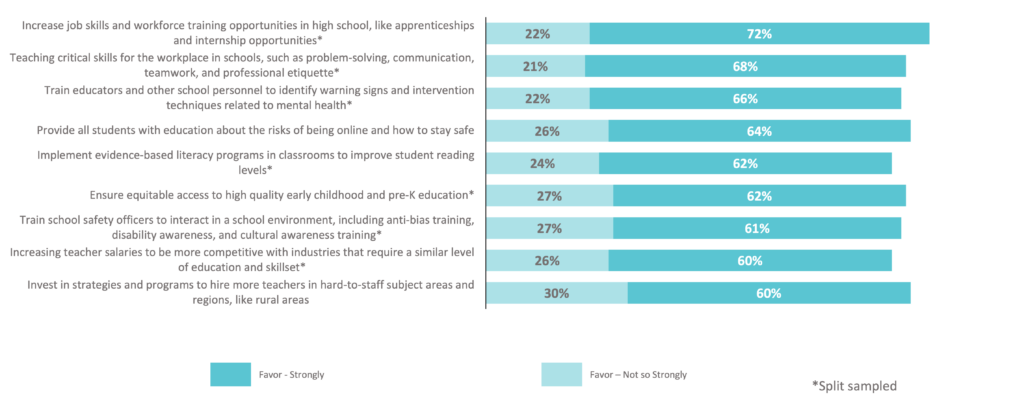 Teaching real-world skills remains top of mind for voters. Over half of voters believe that not teaching real-world skills for the future workforce is a very big problem (54 percent, up from 48 percent in 2022) and a very important issue to address (70 percent). Proposals centered on increasing job skills and workforce training opportunities in high school and teaching critical skills for the workplace in schools, such as problem-solving, communication, teamwork, and professional etiquette were also strongly favored by voters (72 percent and 68 percent, respectively). Notably, voters do not view high-profile issues like book banning and teaching about gender and sexuality in the classroom with nearly as much importance.
Teaching real-world skills remains top of mind for voters. Over half of voters believe that not teaching real-world skills for the future workforce is a very big problem (54 percent, up from 48 percent in 2022) and a very important issue to address (70 percent). Proposals centered on increasing job skills and workforce training opportunities in high school and teaching critical skills for the workplace in schools, such as problem-solving, communication, teamwork, and professional etiquette were also strongly favored by voters (72 percent and 68 percent, respectively). Notably, voters do not view high-profile issues like book banning and teaching about gender and sexuality in the classroom with nearly as much importance.
Parents believe they know how their child is doing academically and social-emotionally. More than nine in ten parents are confident in their personal understanding of how their child is performing not only academically (92 percent confident, 63 percent very confident), but socially, emotionally, and mentally as well (92 percent confident, 62 percent very confident). More than 7 in 10 Black and Latino/a parents are very confident in their understanding of how their child is doing academically.
Parents and voters remain committed to keeping our schools safe. Voters continue to believe that ensuring our public schools are free of guns and other physical violence is a very big problem (53 percent, up from 47 percent in 2022). Voters also believe it is very important we address the need to keep public schools free of bullying and cyberbullying (71 percent, up from 66 percent in 2022).
Voters view curriculum oversight as a partnership between teachers and parents. 55 percent of voters say teachers should have a lot of oversight in K-12 curriculum decisions, followed by parents of school-aged children (44 percent), school principals (36 percent), and local school boards (29 percent). Voters see little role to no role for local and national elected officials (53 and 58 percent, respectively). Voters were also receptive to proposals to ensure parents are involved in setting the curriculum around what their child is taught (76 percent) and a majority indicated they would be willing to review and provide feedback on student curriculum (78 percent). In general, voters feel that parents already have a partnership with teachers, and this feeling has increased over time.
More than 8 in 10 voters believe that parents should be included in their child’s education, and about 7 in 10 voters agree that parents are included in their child’s education and what they are taught. In general, voters feel that parents already have a partnership with teachers already – and this feeling has increased since last year.
Voters nationwide believe we are spending too little on public education. A plurality of voters, 45 percent, say their state spends too little on public school funding, down seven percent from 2022. When we drill deeper down to the community level, voters are split between saying public school funding is the right amount and too little. Voters are less likely to view their local schools as spending too little. Despite this, the prevailing belief nationally continues to be that schools are underfunded.
With just one year remaining before the September 2024 ESSER obligation deadline, The Hunt Institute will continue to leverage our Across the Aisle work to drive equitable investments and outcomes for students that are aligned with parent and voter priorities.
You can find this year’s complete findings below.
